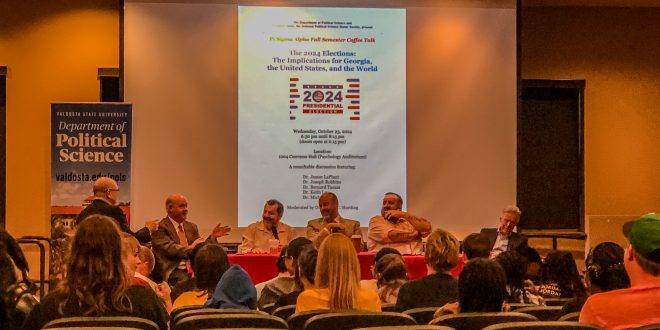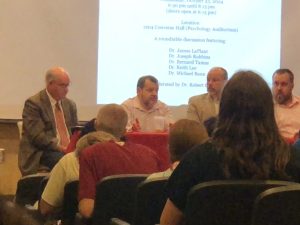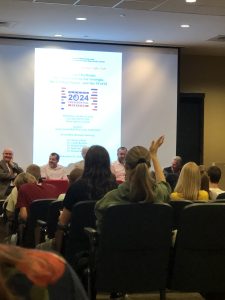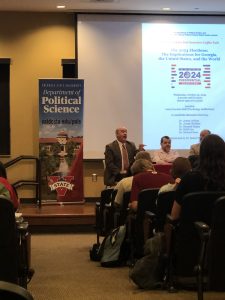On Wednesday, Oct. 24, the Department of Political Science, alongside Pi Sigma Alpha and the National Political Science Honor Society, hosted a roundtable discussion centered on the 2024 elections and their implications for Georgia, the United States and the world.
The significance of the upcoming election looms large, with suggestions it will decisively shape the future of American society. The panelists included Dr. James LaPlant, Dr. Joseph Robbins, Dr. Bernard Tamas, Dr. Keith Lee and Dr. Michael Baun as they discussed the noticeable shift in the political landscape over the past four years, particularly the rising influence of conspiracy theories.
Topics like false claims about voting irregularities and narratives involving prominent figures such as Vice President Kamala Harris and former President Donald Trump have created an environment of uncertainty. This confusion could be especially daunting for first-time voters.
“Peer researchers recently found that 86% of millennials and Gen Z get their news from digital sources. And guess what sources are more exposed to misinformation?” Dr. Robbins said. “The last few weeks we’ve seen a lot of coverage about what Haitian immigrants do and do not eat and discussions about ballots being stolen. All of this is fabricated but spread rapidly on social media platforms.”
One of the audience members relayed that there may be some fear for first time voters and how to approach that feeling.
“Don’t be discouraged to go out and vote, honestly, I think that’s one of the goals for all of this misinformation is to get people confused and uncertain and to get people disengaged. said Dr. Baun. “Do your part by taking part.”
The conversation also turned to the troubling issue of political violence, particularly as it affects young voters. Political violence is inevitable, as seen over the years during election time. The Civil War era saw increased violence, particularly in border states, leading to profound divisions. After the war, Southern states witnessed violence aimed at suppressing Black voters and maintaining white supremacy, exemplified by the actions of groups like the Ku Klux Klan.
In modern day, political violence has evolved, often manifesting through hate crimes and organized violence. As well as the use of social media to fester hate within those who are watching. Dr. Lee voiced his worries, especially for the 18–30 demographic.
“I genuinely worry about political violence,” Dr. Lee said. “While it might not be openly discussed, there are plans being made on platforms like Discord and Reddit. It’s concerning that many young people might be turning out to vote not just to support a candidate, but out of fear.”
This discussion brought to light the significant challenges facing young voters today. With rising political violence and a flood of misinformation, the 2024 election feels more crucial than ever. Engaging and empowering voters, particularly those who may feel anxious or confused, is essential for safeguarding the democratic process.
As the election approaches, it’s clear that informed and active participation is vital. Every voice matters and every vote counts. The 2024 elections will not only decide who leads, but will also test the resilience of American democracy in the face of growing polarization and uncertainty.
Written by Ibec Francis, Photo Editor, Photos by Ibec Francis.
 The Spectator The independent student newspaper of Valdosta State University
The Spectator The independent student newspaper of Valdosta State University









